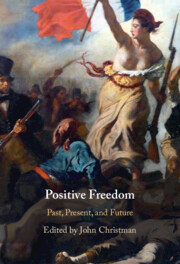Book contents
- Positive Freedom
- Positive Freedom
- Copyright page
- Contents
- Contributors
- Acknowledgments
- Introduction The Multiple Dimensions of Positive Freedom
- Chapter 1 Unity and Disunity in the Positive Tradition
- Chapter 2 Positive Liberty as Realizing the Essence of Man
- Chapter 3 Moral and Personal Positive Freedom
- Chapter 4 Positive Freedom and Freedom of Contract
- Chapter 5 Recognition and Positive Freedom
- Chapter 6 Self-Mastery and the Quality of a Life
- Chapter 7 Basic Freedom in the Real World
- Chapter 8 Reframing Democracy with Positive Freedom
- Chapter 9 Disability and Positive Liberty
- Chapter 10 Positive Freedom and Paternalism
- Chapter 11 Beyond Positive and Negative Liberty
- Chapter 12 Property and Political Power
- Chapter 13 Public Reason, Positive Liberty, and Legitimacy
- Works Cited
- Index
Chapter 7 - Basic Freedom in the Real World
Published online by Cambridge University Press: 03 September 2021
- Positive Freedom
- Positive Freedom
- Copyright page
- Contents
- Contributors
- Acknowledgments
- Introduction The Multiple Dimensions of Positive Freedom
- Chapter 1 Unity and Disunity in the Positive Tradition
- Chapter 2 Positive Liberty as Realizing the Essence of Man
- Chapter 3 Moral and Personal Positive Freedom
- Chapter 4 Positive Freedom and Freedom of Contract
- Chapter 5 Recognition and Positive Freedom
- Chapter 6 Self-Mastery and the Quality of a Life
- Chapter 7 Basic Freedom in the Real World
- Chapter 8 Reframing Democracy with Positive Freedom
- Chapter 9 Disability and Positive Liberty
- Chapter 10 Positive Freedom and Paternalism
- Chapter 11 Beyond Positive and Negative Liberty
- Chapter 12 Property and Political Power
- Chapter 13 Public Reason, Positive Liberty, and Legitimacy
- Works Cited
- Index
Summary
In most discussions of the nature and value of freedom, the setting in which it is meant to be enjoyed is assumed to be the domestic relations among citizens in a stable state.However, current social conditions around the world are rife with porous borders, migrating populations, refugees and those fighting for liberation against oppressive regimes.In this setting, those idealized assumptions do not hold; yet, freedom remains a value such persons.In this chapter, I discuss the nature of freedom in this light, and I defend a notion of basic freedom that, on the one hand includes positive elements such as access to resources and the capacity for self-government, but, on the other, does not require full citizenship in ideally functioning democracies (as do other conceptions).
- Type
- Chapter
- Information
- Positive FreedomPast, Present, and Future, pp. 120 - 140Publisher: Cambridge University PressPrint publication year: 2021
- 1
- Cited by

